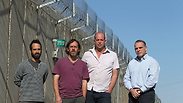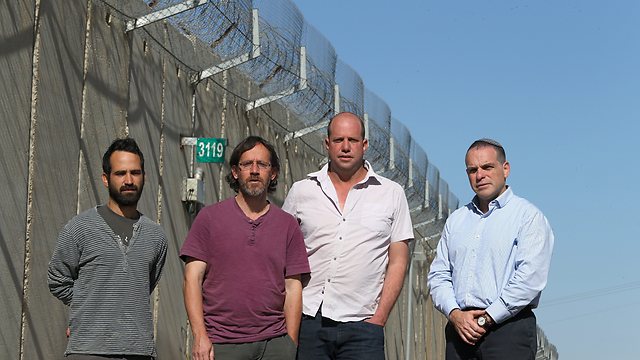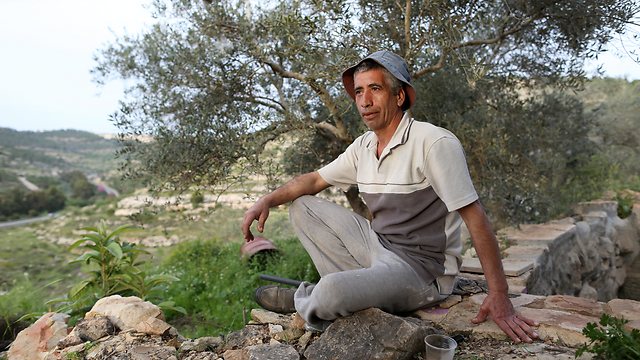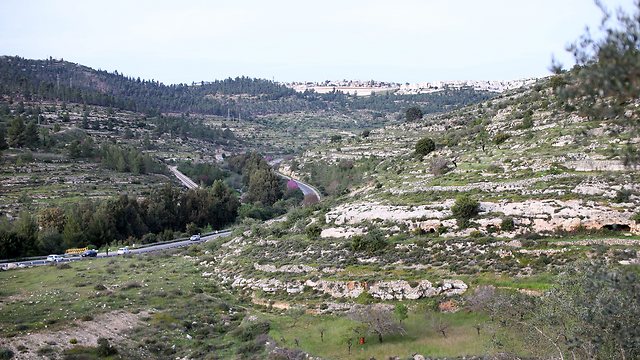
United in opposition to the separation barrier
Two settlers, a Palestinian and two leftist activists are opposed to the resumed construction of the security fence around Efrat; 'We don't want a fence to separate us,' said the mayor.
We stood above Wadi Gilo, the bottom of which was too deep for us to see, and we futilely tried to enjoy the view. Not much is left of the original natural landscape. The tunnel highway crosses the valley south of the bridge, with Beit Jala perched above it. Opposite Beit Jala is Jerusalem's Gilo neighborhood.
Yaron Rosenthal, principal of the Kfar Etzion Field School, lamented the destroyed terraces and the smashed rocks on Mount Gilo. Aviv Tatarsky, a left-wing activist and researcher at Ir Amim, opposed the Israeli appropriation of the ridge: "We know the place's original name was Walaja Ridge."
Three heavy drills bore into the slope. A jeep with security guards stopped next to us to find out what we were doing at the separation barrier construction site. A settler and two left-wing activists meet on a rocky hilltop in front of a settlement and Palestinian village. It sounds like the beginning of a confrontation, but this time it was a rare case of agreement between settlers, left-wing activists and Palestinians. Everyone here was against the barrier. Its construction was recently resumed on the prime minister's order to immediately complete the fence around Jerusalem following a wave of attacks in recent months.
Aviv Tatarsky and Dolev Sheleff tried unsuccessfully to help the Walaja residents in their struggle against the separation fence that is supposed to surround their village. Rosenthal, a settler, also opposed the fence, since it harms the environment and the rights of the Palestinian residents. Later he was joined by another opponent, Oded Revivi, who is the head of the Efrat Municipal Council.

From the hill, we continued to Yasser Khalifa's, a Walaja resident, who was waiting for us on an ancient terrace above the Refaim River, on land that his family worked for generations. All of us wanted to go to his, but he asked us not to bring the settlers.
"It's not a good time," he said. "The atmosphere is bad right now. The last thing that I need is to be photographed with settlers, even if there is a subject that we agreed on."
Kids hugging trees
We spent an entire day walking the fence's route in the Gush Etzion region, located in the south of the Jerusalem area. As in many stories in the territories, the security concern is mixed here with political concerns, and Palestinian interests are not even considered.
Rosenthal, 39, of Kfar Etzion, said that the settlement's opposition to the separation fence's route began more than a decade ago.
"The route that was initially proposed was to include the region's western settlements (Kfar Etzion, Alon Shvut, Bat Ayin, Beitar Illit and Givot) inside the fence, but we decided to do without it, because it would deal a fatal blow to the environment and landscape that we so love. As early as the 80s, they understood the landscape qualities of this region; that's why the tunnel road was built. They could have bypassed Gilo, destroying the valley and the scenery, but they chose an expensive and complicated solution to avoid harming nature.
"Another reason for our opposition is that we have no interest in harming the quality of life of our Arab neighbors. The foundation for a good life here is that it should be good for both sides, not just for one. If it's good for us, then it should be good for them. It's our duty as human beings and our concern as those who live here."
Palestinians and settlers filed petitions to the High Court of Justice against the barrier's planned route in Gush Etzion, each for their own reasons. An appeal to the High Court by the Kfar Etzion Field School was submitted in December 2005, claiming that the barrier would pass through a unique pine grove in the Abu Suda forest.
"The construction was supposed to cut through the whole forest," Rosenthal said. "We held a demonstration and brought children who hugged the trees. The High Court of Justice accepted the petition and ordered the construction to stop there. In other locations in the region, the High Court ordered the construction to stop and asked the defense establishment to plan a new route. We understood that we had succeeded in the struggle, and, for several years, it was quiet."
In 2008, the new route's plan was completed. It was a snaking, twisted and tangled route, which goes down from Checkpoint 300 on the outskirts of Bethlehem heading southwest and cuts off many Palestinian villages from their land. Residents of the affected villages petitioned the High Court of Justice, and construction was delayed again. In 2012, the court completed its deliberations. Most Palestinian demands to change the route were not accepted.
Rosenthal said that he completely understood his Palestinian neighbors' resistance: "In the village of Batir, for example, the fence cuts off farmers from their land."
Plans are underway to construct gates to enable the holders of special agricultural permits to pass.
"Gates are a fiction. The nature of agricultural work is not based on regular working hours. Anyway, not everyone receives permits and there's always a mess and delays. In short, to tell you the truth: it doesn't work."
Not only petitions delayed the start of the construction. Opposition to the construction of a fence that would cut off Gush Etzion from Jerusalem, or turn parts of it into areas imprisoned in a tangle of fences, is shared by all right-wing parties, including parts of Likud. Even when the route was approved by the court, everyone was fine not building the barrier and rationalizing it with budget issues. This continued until public pressure and a feeling of insecurity in the streets following a wave of terror attacks took their toll.
About two weeks ago, following Netanyahu's announcement, Rosenthal organized a special discussion at the field school on the resumption of the barrier's construction. He also invited Aviv Tatarsky from Ir Amim to present the Palestinians' position. "I invited him because a rare coalition was developing here between groups that don't agree on almost anything on a daily basis. But we all agree on the fence."
And yet, you're trying to cooperate with someone who essentially opposes your residing in the territories.
"The Middle East is in such crazy chaos around us, it seems to me that talking with an Israeli who doesn't agree with me it is the least bad thing I could do. I have no desire to discount people just because of their opinions. If Aviv is worried about the human rights of the Palestinians, I'm with him. On the subject of human rights, I am totally with him."
We then went to Walaja and met with Tatarsky and Sheleff at the entrance to the village, which lies opposite the entrance to the settlement of Har Gilo. Rosenthal discovered that Tatarsky's brother was the commander of his paratrooper reconnaissance squad. Sheleff's brother, it turned out, was the squad commander of Tatarsky's brother.
Tatarsky said he likes Rosenthal, "even though we don't agree ideologically."
Rosenthal laughed and replied, "Hold on, Aviv, we don't agree yet, but in the end, we'll reach an agreement. More and more left-wing people realize that there is no chance left for two states. At the end we'll meet in the middle."
We observed the large, white wave intruding on nature, which was prepared as the land on which the fence will be built. "Regardless of who owns this land, Arabs or Jews," said Rosenthal, "there is terrible damage here."
"Although the legal battle has ended," Tatarsky said, "each of us can act in our own manner to explain why this fence is bad. It seems that it's too late to stop it."
A discussion began while we stood at the Palestinian village's entrance. Rosenthal: "In principle, the Right needs to understand that, if they want to govern this place, they need to accept the fact that the Palestinians also live here. The Right needs to separate national rights from human rights. Residents who live here should get as many human rights as possible. "
Tatarsky: "The distinction between national rights and human rights doesn't hold water. It's impossible to separate them. Israel doesn't allow the residents of Walaja to build as part of the political question of who owns this place. So, as part of the national issue, the people's basic right to shelter here is also affected. Palestinians build, and Israel destroys their buildings."
Rosenthal: "I want to change this reality."
Tatarsky: "Yaron's position is logical and moral, but the debate is between us, over the heads of the Palestinians, and that's very problematic."
It all began with meditation
We left Rosenthal and went to Yasser Khalifa, 46, a Prisoner Affairs Ministry clerk in Bethlehem and a farmer. Tatarsky and Sheleff met him through at a "social engagement dharma," a group of meditation practitioners that integrates spiritual practice with social action.
"The connection with Walaja," Sheleff said, "is due to its proximity to Jerusalem. We are a Jerusalemite group, and there have always been good relationships between the peoples of Jerusalem and Walaja. Those ties faded away because of the intifadas, but we reconnected to them because of their fight against the fence. As the legal proceedings dragged on and construction was stopped, all the peace activists from Ta'ayush and Combatants for Peace left. Only we were left with the residents here."
The Khalifa family has 40 dunams of agricultural land on which they grow olives, almonds, apricots, tomatoes, cucumbers and zucchini. "I earn NIS 2,000 a month from my work for the (Palestinian) Authority," said Khalifa, "and from the land, we got a good profit last summer of NIS 12,000. We ate from that—me and the children and my mother, the whole family—and we also distributed the produce, and we were happy. For us, it's very significant, this land. This is an important way for me to make a living. The fence they've begun to build now will disconnect me from the land that I farm.
"I've seen what happens elsewhere in the West Bank when they put in a fence. It's opened at difficult times, and it's opened very little. The seeds are like babies; you can't leave them alone. I show up early in the morning, 4:30, I work until eight, I go to work in an office in Bethlehem, and I come back to my land in the afternoon to water it. If there's a fence, what would we do? How would we take care of the soil that stays on your side? It only causes anger and suffering for people.
"Here, they began working on the fence, and then they stopped because there were court orders; the hearings ended, but they didn't return to work because they said there was no money. What happened now—suddenly they have money? Did terror attacks ever come from here? No terror attacks originated here."
This barrier's planned route passes just below the village's houses and disconnects it from the land. "The petition that the residents filed didn't ask for the fence not to be built, just not to build it adjacent to homes," Tatarsky said. "They should build it down on the highway, which is already on land that was confiscated from them. Nothing helped."
We asked Khalifa why he would not agree to Rosenthal's coming to meet him, since they both agreed about the barrier. "You tell me: Is he ready to live in a Palestinian state, or would he like to be a Jew living on Palestinian land? Because the situation is worse now, I would prefer not to see him. He is on the stronger side.
"Maybe I'm wrong, and he has a good heart, but, in the end, he lives in a settlement with a gun. I have no problem with Jews coming to visit me and hiking there, but that land will be mine. This is our country here, and there," he pointed to the opposite mountain, "is your country. Want a fence? No problem, that's your prerogative; just build it on your land, not on mine."
Later, Efrat Municipal Council's head, Oded Revivi, told us that the fence will only cause damage. "We have a great relationship with the villages of Wadi Rahal, Wadi Nis, and Abdullah Ibrahim. They're considered residents of the Palestinian Authority, but we give them water from our water tower. They come to us for urgent care; if they can't reach us, we come to them with doctors. The medical treatment is free. This is how you build coexistence.
"Efrat is not surrounded by a fence, because its founders didn't want one. There is no barrier that prevents the neighboring villagers from coming to us, and we're good neighbors. When they wanted to erect the separation barrier a decade ago, this was the first place that Jews and Arabs united against its construction. The resistance was conceptual; we didn't want a fence to separate us." He pointed to an agricultural area in front of his council office window. "This is the land of a Palestinian who tills it daily, routinely."
Meanwhile, construction on the separation barrier has not yet begun in Efrat's area, but who knows? Maybe it will start soon. Revivi, who was one of the candidates for attorney general instead of the appointed Avihay Mandelblitt, argued that the step is unnecessary: "As soon as there's a bit of pressure, suddenly decisions are made without evaluating if they're worthwhile. They didn't refrain from building the fence in Gush Etzion for nothing, although the route's plan has been around for years. After all, it hasn't been proven that the fence is effective against terror attacks. They are continuing its construction now to create a sense of security, rather than providing a real security response."
So resuming construction on the fence is only for public appearance—they'll build just a small section and stop?
"It's very possible; I wouldn't rule it out. If a fence is built here, it would cut Efrat off from the three neighboring Palestinian villages. It would spoil the relationships. We wouldn't be able to continue supplying them with water and providing medical care.
"On Friday, for example, a race will be held in Efrat. The starting line is on Givat Haitim, and the route goes through Wadi Nis and Abdullah Ibrahim. It's part of our relationship with the neighbors. A fence would just ruin it."
Before we left, we asked them what else could be done if the whole affair has already been authorized by the High Court of Justice.
"It's true that, legally, the story is done," Rosenthal answered, "but, in the end, this is a political decision. If the defense minister would understand that there's no benefit to the fence, he could order the construction's cessation. We'll turn the road that they've paved for the fence into a scenic route for Arabs and Jews."












